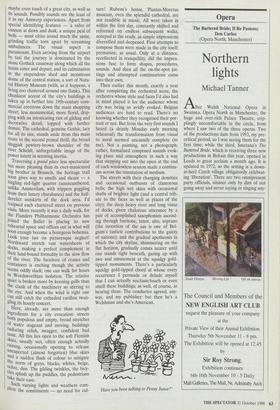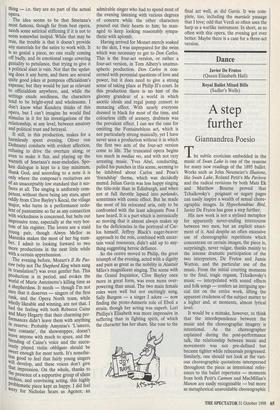Opera
The Bartered Bride; II Re Pastore; Don Carlos (Opera North, Manchester)
Northern lights
Michael Tanner
After Welsh National Opera in Swansea, Opera North in Manchester, the huge and over-rich Palace Theatre, crip- plingly uncomfortable in the circle, from where I saw two of the three operas. Two of the productions date from 1993, my pre- critical period, so I was seeing them for the first time; while the third, Smetana's The Bartered Bride, which is receiving three new productions in Britain this year, opened in Leeds to great acclaim a month ago. It is updated to 1972, so the setting is a down- at-heel Czech village obligatorily celebrat- ing 'liberation'. There are two omnipresent party officials, sinister only by dint of not going away and never saying or singing any- thing — i.e. they are no part of the actual opera.
The idea seems to be that Smetana's most famous, though far from best opera, needs some satirical stiffening if it is not to seem somewhat insipid. While that may be true, the trouble is that it doesn't provide any materials for the satire to work with. It is so genial a piece, no one really coming off badly, and its emotional range covering geniality to petulance, that trying to give it a political slant is vain. Not that the updat- ing does it any harm, and there are several quite good jokes at pompous officialdom's expense; but they would be just as relevant to officialdom anywhere, and, while the settings exude seediness, the characters tend to be bright-eyed and wholesome. I don't know what Kundera thinks of this opera, but I can't imagine he would find stimulus in it for his investigations of the relationship, at any level, between amatory and political trust and betrayal. It still, in this production, makes for a harmlessly spent evening. Oliver von Dohnanyi conducts with evident affection, refusing to drive the overture along, or even to make it fizz, and playing up the warmth of Smetana's near-melodies. Spo- ken dialogue is kept to a tiny minimum, thank God, and according to a note it is only where the composer's recitatives are of an unacceptably low standard that it sur- faces at all. The singing is uniformly com- petent, without there being any stars, apart oddly from Clive Bayley's Kecal, the village major, who turns in a performance redo- lent of pantomime so far as any connection with wickedness is concerned, but belts out Impressive tone, especially at the very bot- tom of his register. The lovers are a staid Young pair, though Alwyn Mellor as Marenka makes the most of her big num- ber. I admit to looking forward to two More productions in the next little while with a certain apprehension. The evening before, Mozart's II Re Pas- tore (why not The Shepherd King when sung translation?) was even gentler fun. This production is in period, and evokes the world of Marie Antoinette's killing time as a shepherdess. It needs — though I'm not sure that it deserves — singers of the first rank, and the Opera North team, while wholly likeable and winning, are not that. I had the feeling with both Rebecca Caine and Mary Hegarty that their charming per- formances didn't leave them with anything in reserve. Probably Amyntas's 'L'amero, saro costante', the showstopper, doesn't leave anyone with much to spare, and the succu- lently of Caine's voice and the succu- lently played violin obbligato should be sweet enough for most teeth. It's nonethe- less good to feel that fairly young singers will develop, and these voices don't give Tat impression. On the whole, thanks to the presence of a supportive group of silent urchins, and convincing acting, this highly Problematic piece kept us happy. I did feel sorry for Nicholas Sears as Agenor, an admirable singer who had to spend most of the evening listening with various degrees of concern while the other characters poured out their hearts to him; he man- aged to keep looking reasonably sympa- thetic with aplomb.
Having arrived for Mozart merely soaked to the skin, I was unprepared for the swim which was necessary to get to Don Carlos. This is the four-act version, or rather a four-act version, in Tom Albery's unatmo- spheric production. Don Carlos is con- cerned with perennial questions of love and power, but it does need to give a strong sense of taking place at Philip II's court. In this production there is no hint of the gloomy grandeur of a world in which ascetic ideals and regal pomp consort to menacing effect. With nearly everyone dressed in black for most of the time, and colourless cliffs of scenery, drabness was the prevalent effect. I can see the case for omitting the Fontainebleau act, which is not particularly strong musically, yet I have never seen a production without it in which the first two acts of the four-act version come to life. The truncated opera begins too much in medias res, and with not very arresting music. Yves Abel, conducting, pulled his punches in this scene, seeming to be inhibited about Carlos and Posa's `friendship' theme, which was decidedly muted. Julian Gavin was less happy singing the title-role than in Edinburgh, and when not at full throttle lapsed into parlando, sometimes with comic effect. But he made the most of his relocated aria, only to be confronted with the least adequate Posa I have heard. It is a part which is intrinsically so moving that it almost always makes up for the deficiencies in the portrayal of Car- los himself. Jeffrey Black's eager-beaver approach to the role, combined with uncer- tain vocal resources, didn't add up to any- thing suggesting heroic defiance.
So the centre moved to Philip, the great triumph of the evening, acted with a dignity and pain as great as the nobility in Alastair Miles's magnificent singing. The scene with the Grand Inquisitor, Clive Bayley once more in great form, was even more over- powering than usual. The two main female roles were well but not excitingly sung, Sally Burgess — a singer I adore — now finding the proto-Amneris role of Eboli a strain, though her acting was superb. Lori Phillips's Elisabeth was more impressive in suffering than in fighting spirit, of which the character has her share. She rose to the final act well, as did Gavin. It was com- plete, too, including the marriale passage that I love; odd that Verdi so often uses the harp as a warlike instrument. In short, as so often with this opera, the evening got ever better. Maybe there is a case for a three-act version.



















































































 Previous page
Previous page